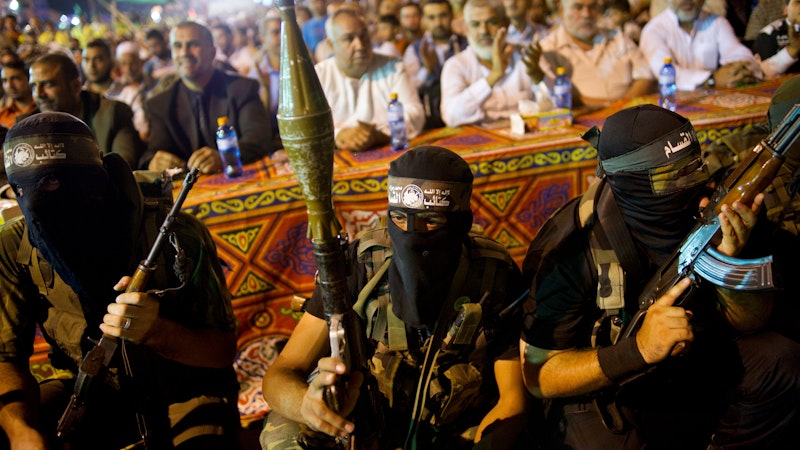I’ve never doubted there’s profound evil in the world. My family history, on my father’s side, includes fleeing from the Nazis, before the extended family was slaughtered. On my mother’s side, my grand-aunt saw the Communists’ enemies hanging on meat hooks in Russia after World War I, and she was wounded by a gunshot from the Bolsheviks. In Venezuela, I once visited one of my father’s friends, who had a number tattooed on his arm; he and his wife had lately been held at gunpoint by robbers and had then built a high wall around their house, which reminded him of his time in Auschwitz. On 9/11 I was in Manhattan, where I lived, when the planes hit; later I attended the funeral of a 30-year-old firefighter, a friend of a friend, who’d died at the World Trade Center. In my town in New Jersey, I drive on a street named after another firefighter, a friend’s brother, who died the same way.
Last Saturday, I attended a wonderful bar mitzvah in Manhattan that had a security guard, a wise precaution amid surging anti-Semitism. People referred to “these dark times,” but celebrated the bar mitzvah anyway, as they should and must. I think a lot about the hostages held by Hamas, including some 30 children, the youngest of whom is an Argentine baby who was nine months old on October 7, and now 10 months old, if still alive. I note that the people demanding a ceasefire in Gaza generally make no mention of the hostages. I grieve that Gazan children are killed by Israeli bombs, and reject any notion of collective punishment of the Palestinians for what Hamas has done and is doing. But it’s Hamas that’s deliberately putting those children in harm’s way, much as it’s Hamas that steals international aid aimed at alleviating the misery in Gaza, including taking fuel from hospitals.
The selective outrage of anti-Israel protestors is rife with anti-Semitism, but also reflects a broader indifference to suffering and persecution when those can’t readily be blamed on certain villains specified by the “decolonial” narrative. Various groups that have been victimized, including Muslim demographic groups, get short shrift from the American and European left, and from the Muslim world as well. How many people are protesting China’s repression of the Uighurs, Pakistan’s expulsion of Afghans, the treatment of the Rohingya in Myanmar, or of the Kurds in Turkey, Iran and elsewhere? I’ve spent time in Nepal and India where Tibetan refugees and a government-in-exile fled from China; other than some converts to Buddhism, how many people in the West pay attention to Tibet’s plight? Spare a thought for persecuted groups whom Western leftists likely never heard of, such as Nepalis expelled from Bhutan.
At the reception following last Saturday’s bar mitzvah, I chatted with a hedge-fund manager who’s also on the board of a foreign-policy think tank. He said we’ve reached “peak China,” meaning that a declining population and economic problems are undermining China’s potential to become the world’s most-powerful nation. My interlocutor said that Xi Jinping will be remembered as a leader who damaged China’s prospects; however, he added that China’s military power hasn’t peaked yet, and acknowledged that there’s a chance the country will become more, not less, dangerous, in response to limits.
I tend to be an optimist, as I wrote recently, and as I sipped a cocktail amid dancing Jewish kids, I wondered whether there might be such a thing as “peak evil.” There’s always malevolence in the world, but its pervasiveness and intensity vary, and perhaps such recent manifestations as the invasion of Ukraine and the October 7 Sabbath massacre represent a moment when the evil powers overreached.
Acts of brutal aggression have the effect of opening the world’s eyes to the nature of the aggressor; and while there are always those who will blame or scoff at the victims, or deny that the atrocities occurred, a major human response to clear-cut evil is to fight against it. There is such a thing, as Graeme Wood points out, as “catastrophic success.” It’s apparent that Hamas didn’t expect the number of murders and kidnappings it would be able to inflict on October 7, the scale of the Israeli response, or that the U.S. would back that response would substantial aid and aircraft carriers. It’s evident that the leader of Hezbollah, congratulating Hamas on its atrocity but saying he had no advance knowledge of it, fears what the response would be if he were to escalate the war. Iran’s showing a similar desire not to cross a red line that will unleash something it’s not ready for.
In responding to evil, it’s important to include those who pull strings from a distance. Among other consequences, I hope to read future news stories in which the leaders of Hamas now living in luxury in Qatar are blown to pieces.
—Kenneth Silber is author of In DeWitt’s Footsteps: Seeing History on the Erie Canal and posts at Post.News.

